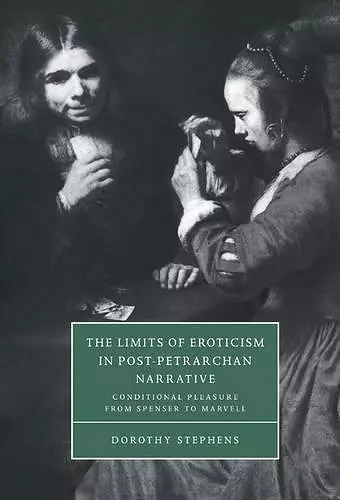The Limits of Eroticism in Post-Petrarchan Narrative
Conditional Pleasure from Spenser to Marvell
Format:Hardback
Publisher:Cambridge University Press
Published:26th Nov '98
Currently unavailable, and unfortunately no date known when it will be back
This hardback is available in another edition too:
- Paperback£40.99(9780521034692)

Alternative forms of eroticism in post-Petrarchan English literature of the sixteenth and seventeenth centuries.
Petrarch imagined that the hopeless but pure love of a woman could lead a man to heaven. In sixteenth-century England Edmund Spenser wrote poetry in the Petrarchan tradition while flirting with a very different kind of feminine image, creating an alternative form of eroticism to which later writers responded.Although theories of exploitation and subversion have radically changed our understanding of gender in Renaissance literature, to favour only those theories is to risk ignoring productive exchanges between 'masculine' and 'feminine' in Renaissance culture. 'Appropriation' is too simple a term to describe these exchanges - as when Petrarchan lovers flirt dangerously with potentially destructive femininity. Spenser revises this Petrarchan phenomenon, constructing flirtations whose participants are figures of speech, readers or narrative voices. His plots allow such exchanges to occur only through conditional speech, but this very conditionality powerfully shapes his work. Seventeenth-century works - including a comedy by Jane Cavendish and Elizabeth Brackley, and Upon Appleton House by Andrew Marvell - suggest that the civil war and the upsurge of female writers necessitated a reformulation of conditional erotics.
"Stephens handles Spenser's famously intricate language with precision and uncommon insight." Choice
"The book is the best and most thorough to date to explore a trope that has recently received a good bit of attention: the feminized imaginative faculty." Theresa M. Krier, Modern Philology
"...Stephens' readings of the Cavendish/Brackley and Marvell texts are characteristically probing, once again demonstrating the exceptional critical acumen that is the hallmark of this fine study." Renaissance Quarterly
"...rich and rewarding..." Spenser Newsletter
"Waht the superficial glance misses...this book delights to reveal." Journal of English and Germanic Philology
ISBN: 9780521630641
Dimensions: 229mm x 152mm x 19mm
Weight: 560g
264 pages